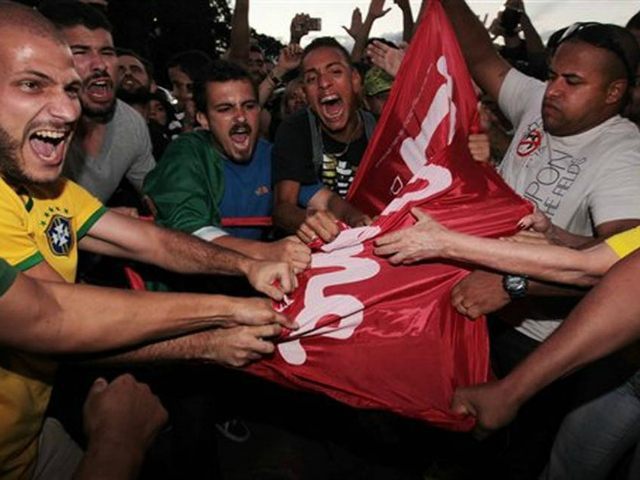On Sunday, Brazil’s President Dilma Rousseff praised the nearly four million Brazilians who took the streets to call for her impeachment for maintaining the peace. The drama unraveling at the highest levels of the executive has evolved significantly since then, with Rousseff’s leftist Worker’s Party in greater danger of being run out of office and police now resorting to using water cannons to blast protesters out of the streets.
In addition to police pushback, supporters of Rousseff, former president of Brazil Luiz Inacio Lula da Silva, and the socialist party have begun targeting and attacking protesters.
Brazilians have been protesting for nearly a year against their government as accusations have trickled into the press against Rousseff and her officials in connection to a police investigation known as Operation Car Wash (“Lava Jato”). Brazilian prosecutors are alleging that Workers’ Party officials have established an elaborate corruption scheme at Petrobras, the nation’s state-owned oil corporation, in which they have overcharged on Petrobras projects for years and pocketed the cash. Directly implicated in the scandal last week was former president da Silva, accused of funding Workers’ Party campaigns with the money. Rousseff served as Minister of Energy under da Silva, though she has not directly been implicated in the Petrobras affair.
Rousseff appointed da Silva her new Chief of Staff on Thursday, granting him executive immunity following the release of a witness testimony implicating him. The appointed prompted protests even within the impeachment ceremony, where an unidentified guest shouted “shame!” at the president before her remarks.
A federal court issued an injunction blocking the appointment, accusing Rousseff of potential obstruction of justice, but not before protesters took to the streets against the move. Outside of the event in Brasilia, protesters congregated to demand Rousseff resign. Unlike the peaceful protests of last Sunday, however, these protesters were met with several hundred supporters of the leftist head of state, and the situation turned violent.
Since then, small congregations of radical leftists have organized small rallies in support of both Rousseff and da Silva, though their efforts pale in comparison to the protesters’.
Contra os defensores de privílégios que condena e querem destruir direitos #VemPraDemocracia pic.twitter.com/o5iF5hy25q
— SilviaRochaLeyMedios (@1SRochaS) March 18, 2016
AO VIVO: Grupo pró-Dilma começa a chegar para protesto na Avenida Paulista https://t.co/rFsO8UcgEJ pic.twitter.com/TQETMj2qdX
— Estadão (@Estadao) March 18, 2016
In Sao Paulo, where 1.4 million people took to the streets calling for Rousseff to step down on Sunday, an estimated 150,000 people congregated and vowed not to leave Paulista Avenue, the heart of the city, until Rousseff resigned. “We are going to protest like they did in Ukraine. There will be more of us tomorrow,” Cristiane Galvao, 44, told AFP. “People are supporting us. They are bringing us water and food. We will stay here until Dilma falls.”
Rally in Sao Paulo against Lula’s appointment as cabinet chief. By Andressa Anholete #AFP pic.twitter.com/p7vX2KobNE
— AFP Photo Department (@AFPphoto) March 17, 2016
Police, who had been extremely tolerant of protests earlier in the week, attempted to clear the street early Friday morning, firing tear gas and water cannons at the protesters. Protesters were given 15 minutes to leave or face attack. Many of those who left, O Globo notes, are planning to return with tents and sleep on the street until the Workers’ Party clears the entire government.
Despite Rousseff’s far-left allegiance, the groups against her are not entirely right-wing. As a testament to this, a crowd holding signs reading “Lula Go to Jail” began chanting a classic Marxist slogan at one protest: “the people united will never be defeated.”
The protests have clearly alarmed the heads of the Workers’ Party, who have begun accusing their opponents of wanting a coup d’etat and comparing them to Nazis. During her speech before appointing da Silva, Rousseff protested that a wiretapped call linking her directly to da Silva’s corruption case should never have been released to the public, warning, “this is how coups begin.” Similarly, the government of Bahia state, Rui Costa, compared protesters to Nazis on Friday.
“In Germany, when Nazism began, there was also broad popular support,” he claimed. “Today, the German people are ashamed.”
Leftist dictator Nicolás Maduro of Venezuela has also supported the Rousseff administration, accusing the courts investigating both Rousseff and da Silva of a “media and judicial coup.”

COMMENTS
Please let us know if you're having issues with commenting.